To me, the biggest attraction to Dashboard is the fact that you move very useful items off of your desktop and onto basically a separate desktop that is very easy to access. Apple provides a total of 14 widgets with Tiger (and a link to download many, many more) and they also provide excellent documentation for developers to make their own widgets. Here are the widgets that are included in Tiger:
Address Book
Calculator
Calendar
As a Windows user, I always found myself clicking on the clock in the Taskbar to bring up a calendar for this very purpose, so I have extra appreciation for this particular widget.
Dictionary
Flight Tracker
iTunes
Phone Book
Stickies
Stocks
The graphing capabilities aren't anything too impressive though, as you have no option for a weekly graph. The data is all pulled from Quote.com.
Tile Game
Quite possibly the most useless widget to me is the Tile Game. I guess that's just not the type of gaming I'm into. But for those who do enjoy it, the Tile Game widget is interesting, although it goes against what seems to be one of the major purposes of the Dashboard - for items that require very little interaction/just a quick glance.
Translation
Chinese (simplified), Chinese (traditional), Dutch, English, French, German, Greek, Italian, Japanese, Korean, Portuguese, Russian and Spanish. Unfortunately, I'm not fluent in all of those languages, so I can't attest to how accurate of a widget it is, but it seemed to handle English to German translation relatively well.
You can type in words or paste full paragraphs, although there is a 40-word limit. So, if you're looking to translate an entire paper, you're going to have to use something else.
Unit Converter
Weather
World Clock
For me, I use Dashboard on a very regular basis - I'd say that I probably use it more than any of the new features in Tiger, since I always check in with widgets on the Dashboard multiple times throughout the day. If Apple's goal with Dashboard was to reduce desktop clutter and improve productivity in the sense that you don't have to waste time getting information and utilities from various websites, then Dashboard is an astounding success.
Dashboard isn't entirely flawless. Like many aspects of Tiger, there are some annoyances with Dashboard. My major issue with Dashboard is mostly visible on the PowerBook, where I'm not always connected to the Internet. My problem is that none of the data in any of the Dashboard widgets appears to be cached, so when you hit F12 on the PowerBook, there is a very annoying delay where all of the widgets that rely on an active Internet connection for their data (e.g. most of them) appear blank for a few seconds.
Also during this period while Dashboard attempts to update all of the active widgets, you may have the desire to just go back to your desktop, which isn't always possible. Hitting F12 immediately after looking at the Dashboard and finding nothing but blank widgets won't always work. Most of the time, you have to wait a few seconds before you regain control over that aspect of your system. I have to reiterate that these issues are only visible on the PowerBook; on a desktop that's always on (or a PowerBook that is always connected to the Internet and doesn't go to sleep), the Dashboard data is never touched and the widgets always remain full of information.
Some of the widgets will still have to update themselves after you have pressed F12, even if you are currently connected to the Internet. It appears that although the widgets are always loaded in memory, they don't eat up any CPU time; meaning that they don't constantly remain updated while Dashboard is inactive. For example, my computer remains on while I sleep, and when I get up in the morning, one of the first things that I do is bring up the Dashboard to check the Weather widget to find out how cold it's going to be in CT today. For the first second or so, the weather still reads as yesterday's temperatures, before it updates itself and displays today's forecast. The same applies to the clocks; even while regularly using the computer, the Clock widgets don't constantly update themselves. So, when I hit F12, the clocks take a second or two to update before displaying the correct time for whatever time zone that I have them set. I guess in the end, I would rather not have the Dashboard impact performance elsewhere in the system by dedicating CPU resources to updating each and every widget, but if there was a way around these issues without impacting the experience in the rest of the OS, it would be nice to see that implemented. Maybe Apple will need to move to dual core dual G5s so that one of the four cores can be used to keep Dashboard updated at all times.
Address Book
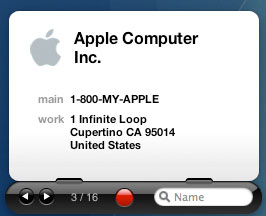
Calculator

Calendar

As a Windows user, I always found myself clicking on the clock in the Taskbar to bring up a calendar for this very purpose, so I have extra appreciation for this particular widget.
Dictionary

Flight Tracker
![]()
iTunes

Phone Book

Stickies
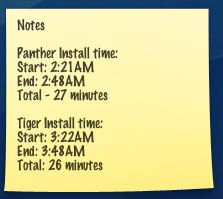
Stocks

The graphing capabilities aren't anything too impressive though, as you have no option for a weekly graph. The data is all pulled from Quote.com.
Tile Game
Quite possibly the most useless widget to me is the Tile Game. I guess that's just not the type of gaming I'm into. But for those who do enjoy it, the Tile Game widget is interesting, although it goes against what seems to be one of the major purposes of the Dashboard - for items that require very little interaction/just a quick glance.
Translation

Chinese (simplified), Chinese (traditional), Dutch, English, French, German, Greek, Italian, Japanese, Korean, Portuguese, Russian and Spanish. Unfortunately, I'm not fluent in all of those languages, so I can't attest to how accurate of a widget it is, but it seemed to handle English to German translation relatively well.
You can type in words or paste full paragraphs, although there is a 40-word limit. So, if you're looking to translate an entire paper, you're going to have to use something else.
Unit Converter
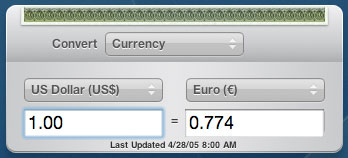
Weather

World Clock

For me, I use Dashboard on a very regular basis - I'd say that I probably use it more than any of the new features in Tiger, since I always check in with widgets on the Dashboard multiple times throughout the day. If Apple's goal with Dashboard was to reduce desktop clutter and improve productivity in the sense that you don't have to waste time getting information and utilities from various websites, then Dashboard is an astounding success.
Dashboard isn't entirely flawless. Like many aspects of Tiger, there are some annoyances with Dashboard. My major issue with Dashboard is mostly visible on the PowerBook, where I'm not always connected to the Internet. My problem is that none of the data in any of the Dashboard widgets appears to be cached, so when you hit F12 on the PowerBook, there is a very annoying delay where all of the widgets that rely on an active Internet connection for their data (e.g. most of them) appear blank for a few seconds.
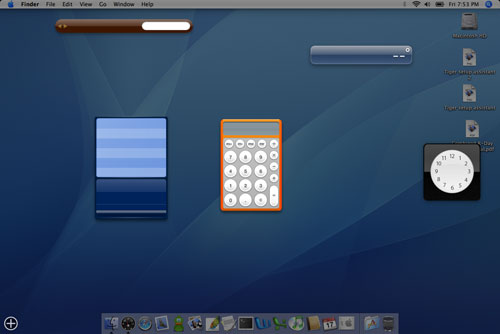
This is the result when hitting F12 on the PowerBook during the first few seconds of coming out of its slumber.
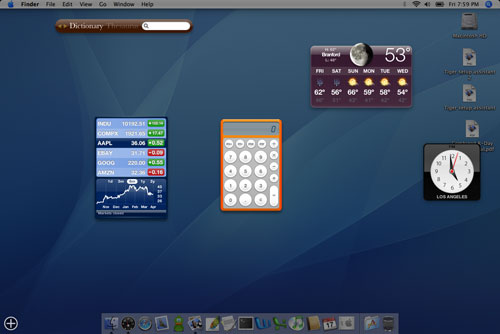
After a few seconds, this finally appears. Note how the name of the Dictionary/Thesaurus widget doesn't actually appear until now.
Also during this period while Dashboard attempts to update all of the active widgets, you may have the desire to just go back to your desktop, which isn't always possible. Hitting F12 immediately after looking at the Dashboard and finding nothing but blank widgets won't always work. Most of the time, you have to wait a few seconds before you regain control over that aspect of your system. I have to reiterate that these issues are only visible on the PowerBook; on a desktop that's always on (or a PowerBook that is always connected to the Internet and doesn't go to sleep), the Dashboard data is never touched and the widgets always remain full of information.
Some of the widgets will still have to update themselves after you have pressed F12, even if you are currently connected to the Internet. It appears that although the widgets are always loaded in memory, they don't eat up any CPU time; meaning that they don't constantly remain updated while Dashboard is inactive. For example, my computer remains on while I sleep, and when I get up in the morning, one of the first things that I do is bring up the Dashboard to check the Weather widget to find out how cold it's going to be in CT today. For the first second or so, the weather still reads as yesterday's temperatures, before it updates itself and displays today's forecast. The same applies to the clocks; even while regularly using the computer, the Clock widgets don't constantly update themselves. So, when I hit F12, the clocks take a second or two to update before displaying the correct time for whatever time zone that I have them set. I guess in the end, I would rather not have the Dashboard impact performance elsewhere in the system by dedicating CPU resources to updating each and every widget, but if there was a way around these issues without impacting the experience in the rest of the OS, it would be nice to see that implemented. Maybe Apple will need to move to dual core dual G5s so that one of the four cores can be used to keep Dashboard updated at all times.










55 Comments
View All Comments
pecosbill - Monday, May 16, 2005 - link
As for your comments on the bugs in the initial release, I couldnt' agree with you more. Apple seems to have taken a page from Microsoft whereby only critical bugs are fixed for a .0 release. The other thing to consider is Apple relelased new hardware around the same time. My new 2.3DP G5 came with Tiger pre-installed. Apple used to have a strict tie between hardware and OS so any delay in Tiger would delay the hardware. I'm rather sure that has decreased now, but they may rather not support the older version of the OS on newer hardware as that raises costs due to compatibility testing requirements.pecosbill - Monday, May 16, 2005 - link
msva124 - Thursday, May 5, 2005 - link
>NeXT and NeXT step succeeded in the markets where it succeeded.In other news, among stocks that went up yesterday, stocks were up.
JAS - Thursday, May 5, 2005 - link
OS 10.4 has already exceeded my expectations.I was a little hesitant to install the new OS on my two Macs until the first update (10.4.1) is released. But today, I installed Tiger on a secondary drive in my dual processor G4 desktop Mac. I was pleased with the boost in overall system performance and did not encounter any software incompatibilities. So, I installed 10.4 on my G4 iBook, too. No problems there.
The first improvements I noticed are with Safari and Finder operations. Dashboard, Spotlight and the new iChat AV are very cool. I just played a high-definition QuickTime movie trailer for the first time. The image quality is spectacular on my Cinema Display.
I've upgraded QuickTime 7 to "Pro." I like how you can now record audio directly within QuickTime.
Although there's room for improvement in certain areas, I think Apple has done a fabulous job with Tiger. I'm looking forward to seeing what the incremental 10.4 updates will bring over time.
CindyRodriguez - Wednesday, May 4, 2005 - link
Ah, I almost forgot:"The "foundation" for OS X was kind of forced into play, you know...;) And, it was years late and initially very lacking in promised features (many of which it still lacks.) "
You really have no idea what you are talking about do you?
How was it forced into play? Because Apple chose it over BeOS? Because Apple recompiled OpenStep for PowerPC? Because Apple came up with Carbon libraries to seamlessly run classic Mac OS Software in OS X natively with almost zero changes to code? Man did they force that sucker in.
What I really wanted to ask you was, what features are still missing? What was promised at the purchase of NeXT but hasn't been delived yet?
Finally, how was it years late? You are specifically talking about the NeXT/OpenStep core as far as I can tell. Are you talking about the first OS X Server release which was way more NeXT than the current OS X distribution (which has a FreeBSD core)? Or are you just talking out your butt again and confusing Copeland with NeXT and FreeBSD?
Considering that Apple bought an OS that didn't even have SMP support because a MAJOR library in the development environment wasn't threadsafe and they almost completely reworked it into the basis of today's OS X in a couple years.. I think that's pretty damn timely, don't you?
CindyRodriguez - Wednesday, May 4, 2005 - link
WaltC:Do you believe all the crap you write?
How many times to people have to point out to you that MICROSOFT was the one who started all the Tiger/Longhorn comparisons? Blame freaking Jim Alchin for comparing his vaporware to Apple's soon to ship OS. (BTW, last time I heard, WinFS was scrapped)
Also, NeXT didn't "fail". it was bought by Apple. It certainly wasn't the company it was intended to be when Apple bought it but it wasn't out of business.
"Oh yes--I suppose that's why the board fired him in '85...;) "
That was an internal power struggle that Jobs lost. I'm not even sure what your point was? Perhaps you wanted to point out how well Apple did after Jobs left?
"Both NeXt and NeXTstep failed commercially as I recall. The "foundation" for OS X was kind of forced into play, you know...;) And, it was years late and initially very lacking in promised features (many of which it still lacks.) "
Um, no. NeXT and NeXT step succeeded in the markets where it succeeded. I bet that's hard for you to grasp but let me break it down. NeXT and OpenStep specifically provided a great development environment and it took of in industries that had a lot of internal custom code. From what I had heard, NeXT, NeXTstep and OpenStep were still very pervasive in the Chicago Stock Exchange well well after the heyday of NeXT pretty much up until Apple's buyout. (OS2 actually had a similar but smaller phenomenon)
"Ah, yes, the RDF again...;) The truth of course is that *nobody knows* what Longhorn will be since Longhorn is a long way out. I see nothing wrong with a Tiger-x64 comparison because MS is *shipping* x64. Pretty simple, really. "
Hmn, good point. I KID. It really was a dumb point.
Microsoft just held a week long conference called WinHEC that focused on guess what? Come on walt, Guess. Do It.
YES!! The focused heavily on Longhorn. In fact, I've hearn no real news out of it other than Longhorn. Gee, I wonder how people (like Jim Alchin) can even compare Longhorn to Tiger considering how tight lipped Microsoft is being about Longhorn features. I mean, aside from the regular info, the early build to developers, and the week long Longhorn love fest a couple weeks ago, we know absolutely nothing about it.
On the other hand, there is the Windows64 comparison argument. Of course, that's pretty dumb too since I don't know of a single feature difference between XP64 and XP-SP2 aside from 64bit libraries. There's also that problem where MS won't even release XP64 for retail sales because driver support is still so crappy.
Other than those few point and all the other ones covered by a dozen other people, I found your comments very enlightening.
Cindy.
rsfinn - Wednesday, May 4, 2005 - link
From page 2: "With Macs, since there's no exposed boot menu, you have to hold down the "c" key while starting your machine to tell it to boot from whatever is in the CD/DVD drive."This works, but most users will never do this -- they'll insert the DVD and double-click the icon labeled "Install Mac OS X". This will set the computer to boot off the DVD and put up a dialog with a "Restart" button. After the installation is finished, the computer will be reset to boot off the partition on which Tiger was installed. No muss, no fuss.
rsfinn - Wednesday, May 4, 2005 - link
From page 3: "I definitely didn't see a single build that was released to developers that was 100% bug free ... with no public beta, and if the bugs aren't getting fixed in the developer release, then who's there to tell Apple when stuff isn't working right in Tiger?"Well, you, Anand, for one. "Beta" is supposed to mean "early access so developers can test the OS against their applications and report problems". Did you report any of the problems you saw in those prerelease builds? Or did you join the developer program just to get early access to the next cool thing?
I'm picking on Anand here to point out this wider misconception about beta software -- even public betas; as a software developer myself it's annoying to me that most people think "public beta" means "I get to play with it for free". If people don't report problems, how can they get fixed?
WaltC - Tuesday, May 3, 2005 - link
#39 "Most of what you said is ridiculous."That's only because you don't really understand what I said at all...;)
#39 "First of all, Apple's market share is growing. Of course other platforms sales aren't Apples sales. But most other sales aren't either Apple/Sun, etc."
Apple's current market share--growing or not--is still ~80% below what it was a decade ago, in terms of percentage. One significant sign of this is the fact there are very few if any Mac-only development houses left in the world today. As I pointed out, the market as a whole is still growing and the fact is that *everybody's* unit numbers are rising because of it. Increased unit sales only counts for increases in market share when they exceed the growth of the market as a whole.
#39" This is mostly an Apple/Wintel market. Sun is only servers and Apple doesn't compete much in their space yet. Apple's server sales are increasing, but are only now ramping up. Except in the scientific Unix space, Apples server sales would be against Windows servers. They don't yet have the breath to compete in the higher areas yet."
Yes, in the Apple/Wintel market it's Wintel ~97%, Apple ~3%.
#39 "Otherwise, it's Apple vs. MS."
Impossible, since the vast bulk of Apple's earnings come from its hardware sales, and MS doesn't sell personal computers of any type (unless you want to count xBox, which would be silly, imo.)
#39 Sure, other pc companies, or rather company (Dell) are growing, but that takes sales away from each other. Apple's increase in marketshare takes away from the Windows market itself. If Dell takes sale from Gateway, it's still a sale for MS. That's the point."
First you say it's an Apple/Wintel market, then you say that every Apple sale is a bite out of Wintel, and then you say that people buying Wintel instead of Apple doesn't even affect Apple sales--which seems to me very much an RDF sentiment if I've ever heard one. If you think a great number of people do not consider and then reject Apple in favor of going Wintel, you are definitely an RDF sufferer...;)
#39 "I suppose that Apple is taking away a few Linux sale as well, but it's almost all MS's."
Have you ever stopped to consider how many Linux sales take bites out of the Apple? For you folks it's always a one-way street where Apple gains but never loses...;)
#39 "All AMD did was to finally come out with better processors that they could actually make, rather than just announce, and then NOT make."
'All AMD did...'--as if it was trivial...;) All AMD did was face a juggernaut with little more than a slingshot for a long time--and manage to win, over and over again. Heh...;) You're funny. The only company you don't trivialize is, of course, Apple...;)
#39 "Apple does directly compete with MS on the OS front. Apple has always had different hardware. When Apple went to the 68000 rather than the 8088 way back when, there were few arguments that the 68000 was not a better chip. Apple simply went on through from there."
You do not understand that an Apple OS *requires* and Apple-branded box *exclusively*. A MS OS will run on boxes manufactured by hundreds of companies around the world--and none of those boxes are made and sold by MS. It's very simple. That's precisely why its a ~97% to 3% market share split, if you haven't figured it out.
39 "If Apple were to change to an x86, then every program would have to be redone. That would be almost impossible for the many Mac developers out there . It's just like the Itanium. Little software development has been done for it. Why should Apple be caught in that trap?"
Itanium is a cpu. OS X is software. FYI, the foundation for OS X, NeXTStep, has *already* been done for x86--years before OS X shipped. "The many Mac developers out there" (heh) could still develop for the Mac since presumably Apple would still sell Macs while releasing an x86 version of its OS *at the same time* which might well attract *many more developers* than Apple presently has.
Last, as noted, the split is *already* ~3% Apple versus 97% x86--so the current situation is not *much different* from the poor Itanium allegory you tried to use, is it?
msva124 - Monday, May 2, 2005 - link
Sorry, it was a dumb mistake. I don't think you are a troll anymore.>If Apple isn't taking away from the Windows market, then which market is it taking away from?
Every sale made by apple doesn't necessarily take away someone else's. There are many users who are more or less satisfied with their current setup of 1 PC, yet decide to go ahead and buy a Mac to complement it. Had Apple not existed, they wouldn't have bought another PC, they would have just stuck with their current setup. So in this case, Apple gains one sale, but PC makers do not lose any. Obviously this is not the case all of the time. The situation is more complex than saying "for every sale made by apple, pc makers lose a sale" or vice versa.